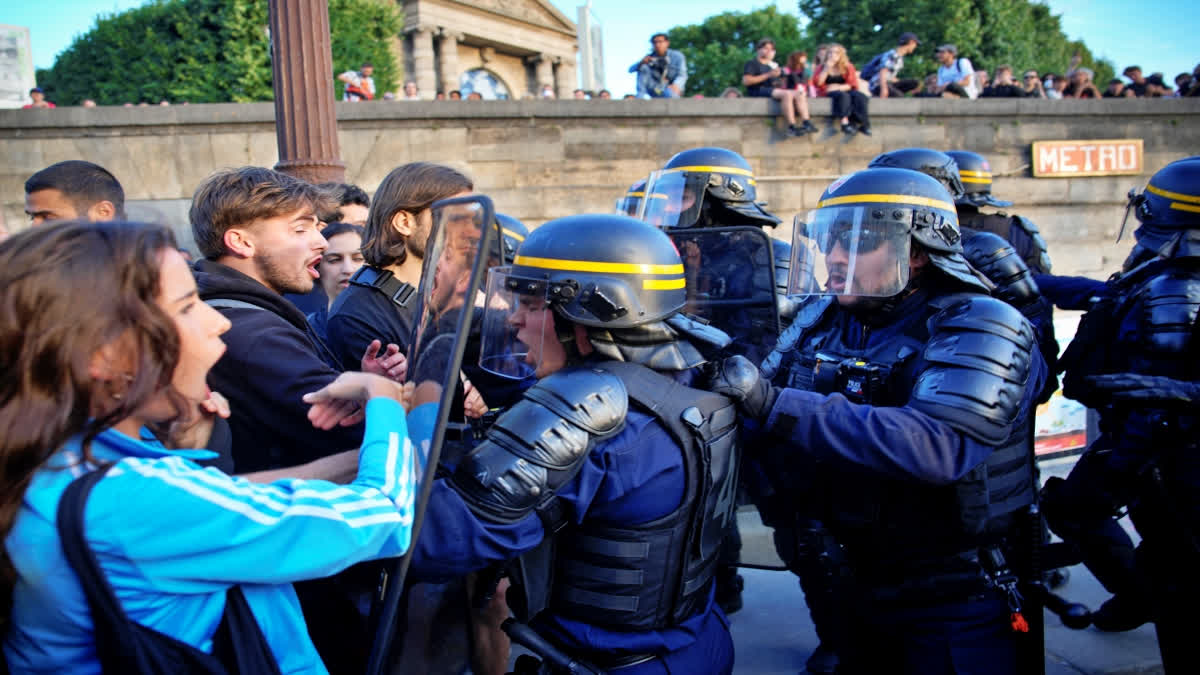Washington: A police killing caught on video. Protests and rioting fueled by long-simmering tensions over law enforcement treatment of minorities. Demands for accountability. The events in France following the death of a 17-year-old shot by police in a Paris suburb are drawing parallels to the racial reckoning in the U.S. spurred by the killings of George Floyd and other people of color at the hands of law enforcement.
Despite the differences between the two countries' cultures, police forces and communities, the shooting in France and the outcry that erupted there this week laid bare how the U.S. is not alone in its struggles with systemic racism and police brutality.
"These are things that happen when you're French but with foreign roots. We're not considered French, and they only look at the color of our skin, where we come from, even if we were born in France," said Tracy Ladji, an activist with SOS Racisme. "Racism within the police kills, and way too many of them embrace far-right ideas so ... this has to stop."
In an editorial published this week, the French newspaper Le Monde wrote that the recent events "are reminiscent" of Floyd's 2020 killing by a white Minneapolis police officer that spurred months of unrest in the U.S. and internationally, including in Paris.
"This act was committed by a law enforcement officer, was filmed and broadcast almost live and involved an emblematic representative of a socially discriminated category," the newspaper wrote.
The French teen, identified only as Nahel, was shot during a traffic stop Tuesday in the Paris suburb of Nanterre. Video showed two officers at the window of the car, one with his gun pointed at the driver. As the teenager pulled forward, the officer fired once through the windshield. Nahel's grandmother, who was not identified by name, told Algerian television Ennahar TV that her family has roots in Algeria.
Preliminary charges of voluntary homicide were filed against the officer accused of pulling the trigger, though that has done little to quell the rioting that has spread across the country and led to hundreds of arrests. The officer said he feared he and his colleague or someone else could be hit by the car as Nahel attempted to flee, a prosecutor has said.
Officials have not disclosed the race of the officer. His lawyer said he did what he thought was necessary in the moment. Speaking on French TV channel BFMTV, the lawyer said the officer is "devastated," adding that "he really didn't want to kill." Nahel's mother, identified only as Mounia M., told France 5 television she's not angry at the police in general. She's angry at the officer who killed her only child.
"He saw an Arab-looking little kid. He wanted to take his life," she said. Police shootings in France are significantly less common than in the U.S. but have been on the rise since 2017. Several experts believe that correlates with a law loosening restrictions on when officers can use lethal force against drivers after a series of terrorist attacks using vehicles.
Officers can shoot at a vehicle when a driver fails to comply with an order and when a driver's actions are likely to endanger their lives or those of others. French police have also been regularly criticized for their violent tactics. Unlike the U.S., France does not keep any data on race and ethnicity as part of its doctrine of colorblind universalism — an approach purporting to see everyone as equal citizens. Critics say that doctrine has masked generations of systemic racism.
"I can't think of a country in Europe that has more longstanding or pernicious problems of police racism, brutality and impunity," Paul Hirschfield, director of the criminal justice program at Rutgers University, said of France. Hirschfield has published multiple papers comparing policing practices and killings in America to those in other countries.
Experts said the video of the shooting — which appeared to contradict initial statements from police that the teen was driving toward the officer — pushed leaders to quickly condemn the killing. French President Emmanuel Macron called the shooting "inexcusable" even before charges were filed against the officer.
That's nothing new for Americans, who even before the excruciating footage of George Floyd's death under a Minneapolis police officer's knee had seen many videos of violent police encounters that were often taken by witnesses and at times contradicted the initial statements of police.
"I've never seen a case where the interior minister was so quick to condemn a shooting. In previous killings, there was unrest, but there was no video. It changes everything," Hirschfield said. Police in France typically go through training that runs for about 10 months, which is long compared with many U.S. cities, but one of the shortest training requirements in Europe.
However, experts said they did not believe French police receive training that is equivalent to the implicit bias training required of many U.S. police officers as an effort to improve policing in diverse communities, though many U.S. critics have questioned the training's effectiveness. France and other European countries have growing African, Arab and Asian populations.
"If you are in a country with a colonial past, it carries a stigma. And if that is painful enough that you can't handle having that conversation about race, of course you aren't going to have relevant training for officers," Stacie Keesee, co-founder of the Center for Policing Equity, who serves on the United Nations' International Expert Mechanism to Advance Racial Justice and Equality in Law Enforcement.
Bertrand Cavallier, the former commander of France's national gendarmerie training school, said French law enforcement should not be judged by the actions of one officer. "This is the case of a police officer who made a mistake and didn't have to do it. But he was arrested, and that, I think, should be a clear message concerning the will of the government," he said. (AP)



